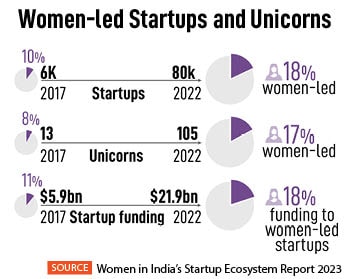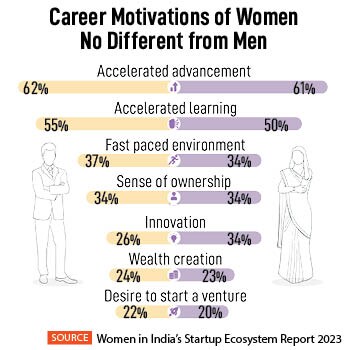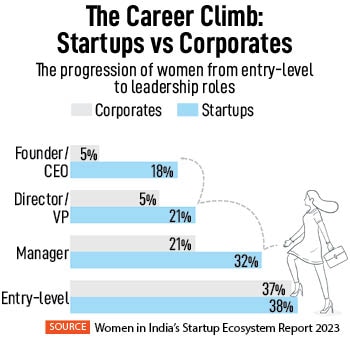Startups have potential to create 2 million jobs for women by 2030: Report
A new report by venture philanthropy organisation ACT shows that the culture at startups helps them move the needle on gender parity faster than established corporates


Startups can lead the way when it comes to achieving gender parity at the workplace, says a new report called "Women in India"s Startup Ecosystem Report 2023" by ACT for Women, which also shows that women comprise 35 percent of the startup workforce, as compared to 19 percent in legacy corporate organisations.
If the needle moves further from the current 35 percent representation of women to 50 percent in 2030—which, as per ACT, requires “careful introspection within the startup community which enables timely and targeted action"—it would mean that startups could potentially create as much as 2.1 million jobs for women in the next seven years.
The report shows that women-led startups particularly perform better in enabling gender equity at the workplace. The total number of recognised startups by DPIIT has grown from 6,000 in 2017 to 80,000 in 2022. The share of women-led startups in this ecosystem has grown from 10 percent to 18 percent in the same time period. In legacy corporates, women hold only 5 percent of the founder/CEO positions.
 As per the report, the cumulative unicorn count in the Indian startup ecosystem rose from 13 in 2017 to 105 in 2022. The corresponding share of women-led unicorns increased from 8 percent to 17 percent. The total venture capital funding for Indian startups rose to $21.9 billion in 2022 from $5.9 billion in 2017. The share of funding to women-led startups has increased from 11 percent to 18 percent in the same time period. The report surveyed around 200 startups across sectors, including unicorns like Swiggy, Zomato, Zenoti, Meesho and Urban Company.
As per the report, the cumulative unicorn count in the Indian startup ecosystem rose from 13 in 2017 to 105 in 2022. The corresponding share of women-led unicorns increased from 8 percent to 17 percent. The total venture capital funding for Indian startups rose to $21.9 billion in 2022 from $5.9 billion in 2017. The share of funding to women-led startups has increased from 11 percent to 18 percent in the same time period. The report surveyed around 200 startups across sectors, including unicorns like Swiggy, Zomato, Zenoti, Meesho and Urban Company.
There are a few characteristics unique to startups that enable better participation, retention and growth of women. First, it takes half the time to become a leader in a startup compared to a corporate. Second, twice as many employees in startups report a greater sense of autonomy than those in large corporations. Third, there are lower barriers for women to occupy core roles of influence in the company, outside of the conventional HR, admin, customer services and marketing functions. The report shows that 21 percent of the startups surveyed had women in R&D roles, 34 percent in finance roles, 25 percent in sales and 20 percent in tech development.
“With startups, there is an exciting opportunity to tap high aspirations early and set gender equality as a priority among founders. In a war for talent, being seen as inclusive, where the most talented and ambitious women can succeed, is a clear competitive advantage," says Vivek Pandit, senior partner, McKinsey & Co. The consultancy is the knowledge partner on this report, which is led by ACT in collaboration with The Udaiti Foundation.
Pandit tells Forbes India that while corporates recruit and advance talent into well-established roles and set gender targets, startups focus more on mindset and fit to culture knowing they are building their culture with every hire.
 “As startups hyper scale, they recruit the best talent they can access, into roles that are ever evolving and often shaped by individuals they hire. While better gender balance may be an unmanaged outcome, the mindset around recruiting and advancement are more open to all talent and merit, and meet women’s professional motivations and support their advancement," says Pandit.
“As startups hyper scale, they recruit the best talent they can access, into roles that are ever evolving and often shaped by individuals they hire. While better gender balance may be an unmanaged outcome, the mindset around recruiting and advancement are more open to all talent and merit, and meet women’s professional motivations and support their advancement," says Pandit.
The report shows that the career motivations that women have is no different from men (see chart), with 61 percent women picking accelerated advancement as their biggest driver, followed by 50 percent picking accelerated learning.
That said, startups can start looking a lot like legacy corporates if they do not tackle the issue of “bunching up of women in mid-level roles", which hampers their advancement into leadership positions, says Aakanksha Gulati, director, ACT. The report shows that while men and women start together, after 10+ years, only 5 in 10 women occupy director / VP positions or higher, compared to 5 in 10 women. A lot of this has to do with matrimony, childbirth, caregiving and other domestic responsibilities, and the associated prejudices that cast a cloud over how women are perceived, and given bigger roles and responsibilities in their workplace.
 Startup founders and boards have to be careful to steer away from these prejudices, Gulati says. The top 10 percent outlier startups they have surveyed, which have achieved close to 40-50 percent gender parity across levels, often place a high value on culture, she adds, which gives exiting DEI policies more teeth. “Top decile companies did not have more DEI policies in place, but had the culture and commitment, top-down, helping ensure policies are authentically embraced and therefore more effective," says Pandit.
Startup founders and boards have to be careful to steer away from these prejudices, Gulati says. The top 10 percent outlier startups they have surveyed, which have achieved close to 40-50 percent gender parity across levels, often place a high value on culture, she adds, which gives exiting DEI policies more teeth. “Top decile companies did not have more DEI policies in place, but had the culture and commitment, top-down, helping ensure policies are authentically embraced and therefore more effective," says Pandit.
The report shows that in order to improve gender representation, organisations have to be sensitised at all levels. While leaders should “allocate time and attention to signal their commitment to equity", managers should support all members of their team equally and HR representatives should develop fair, safe and inclusive policies and processes.
First Published: Oct 31, 2023, 13:34
Subscribe Now